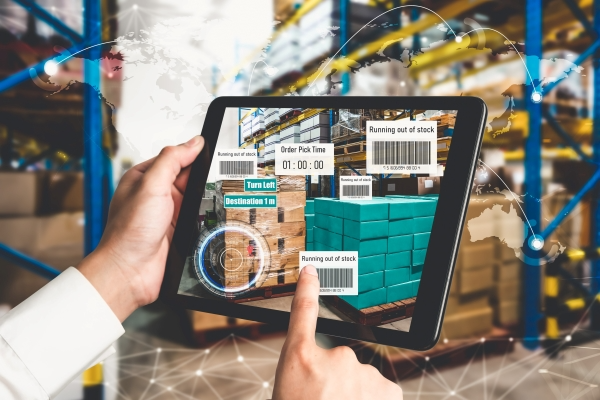Ultimate Guide to AI marketing for E-commerce sellers
Quickly Jump to:
AI Marketing Strategies for E-commerce Sellers
AI Marketing Tools for E-commerce
Best Practices for Implementing AI Marketing
Ways to Use Artificial Intelligence in E-commerce
In today's digital age, E-commerce marketing has become increasingly competitive, and it can be challenging to stand out. AI is changing the game for e-commerce sellers, providing them with tools to understand their customers better and tailor their marketing strategies accordingly. However, many e-commerce sellers still need to learn how to use AI effectively.
ChatGPT’s launch marked a new phase in artificial intelligence (AI), gaining 100 million users in two months. It has become an indispensable tool in many industries, including eCommerce businesses. There is so much we can do with customer data using artificial intelligence.
AI tools have been in the eCommerce industry for a while, and there is a high chance you’ve used one without knowing it. Those eCommerce companies you have an online store with have most likely implemented AI solutions. However, you are steps away from boosting your eCommerce business by actively implementing artificial intelligence.
With the help of AI, marketers can create personalized products recommendation and perform predictive analysis on customer buying behavior. With AI and search engine optimization, automated customer service can help potential customers find your products.
In this ultimate guide to AI marketing for E-commerce sellers, we'll explain AI marketing, how it can benefit e-commerce sellers, the best strategies, and its challenges. We'll also share real-world examples of how top e-commerce companies use AI marketing and best practices to implement it effectively in their businesses.
Understanding AI Marketing
Artificial Intelligence (AI) marketing uses AI technology to improve customer experience, campaign optimization, and company growth. AI marketing uses algorithms and machine learning techniques to analyze customer data, predict behavior, and offer personalized recommendations and experiences.
Types of AI Used in Marketing:
There are several types of AI used in marketing, including:
-
Natural Language Processing (NLP): NLP is an AI technology that helps computers understand human language. It enables chatbots and voice assistants to communicate with customers in natural language, enhancing the customer experience.
-
Machine Learning (ML): ML is an AI technology that enables computers to learn from data and make predictions. It is used in marketing to analyze customer behavior and preferences, personalize product recommendations, and predict customer churn.
-
Deep Learning (DL): DL is an ML type involving artificial neural networks. It is used in marketing to analyze images and videos, recognize patterns, and enhance customer experiences.
Benefits of AI Marketing for E-commerce Sellers:
-
Personalized Marketing: AI enables e-commerce sellers to offer customized marketing experiences to customers based on their preferences, behavior, and purchasing history. This results in higher engagement, conversion rates, and customer loyalty.
-
Predictive Analytics: AI enables e-commerce sellers to analyze customer data and accurately predict their behavior, preferences, and future purchases. This helps them optimize marketing campaigns, product recommendations, and pricing strategies.
-
Improved Customer Experience: AI-powered chatbots and voice assistants enable e-commerce sellers to offer 24/7 customer support, quickly respond to queries and complaints, and provide personalized recommendations.
-
Cost Savings: AI automation of marketing tasks, such as ad targeting, customer segmentation, and data analysis, results in cost savings for e-commerce sellers.
AI Marketing Strategies for E-commerce Sellers
There are many ways. E-commerce sellers can leverage AI to optimize their sales process. Some of the most common strategies include:
Personalization
Personalization is an essential aspect of modern marketing, and AI technology has made it easier than ever to provide personalized experiences to customers. AI-powered personalization allows e-commerce sellers to tailor product recommendations, content, and messaging to individual customers based on their preferences, behavior, and demographics.
AI algorithms analyze customer data to identify patterns and trends that inform personalized marketing strategies. E-commerce sellers can use this data to create customized email campaigns, product recommendations, and even website experiences that resonate with individual customers.
Product Recommendations
AI-powered product recommendations are among the most popular and effective ways that e-commerce sellers use AI technology to enhance their marketing strategies. AI algorithms can predict consumer purchases by analyzing search queries, buy records, and product views.
With AI-powered product recommendations, e-commerce sellers can offer personalized product ideas to customers at every stage of the customer journey. This makes it more likely that the customer will convert and the seller will make a sale.
Chatbots
AI-powered chatbots are revolutionizing customer support by providing 24/7 assistance to customers, improving response times, and enhancing user experience. E-commerce sellers can use AI-powered chatbots to handle customer questions like order tracking and returns. This frees up customer service teams to deal with more complicated problems.
Chatbots can also provide personalized recommendations to customers based on their search queries, purchase history, and browsing behavior, improving the overall customer experience.
Predictive Analytics
Predictive analytics is an essential aspect of AI marketing for e-commerce sellers. AI algorithms can guess how customers will buy in the future by looking at customer data like how they buy, their demographics, and what they do on the web. This can help e-commerce sellers improve their marketing strategies, such as ad placement.
Predictive analytics can help e-commerce sellers optimize product pricing, promotional offers, and marketing campaigns. Using AI-powered predictive analytics, e-commerce sellers can make informed business decisions that increase revenue and profitability.
How to Create an AI Marketing Strategy for E-commerce Sellers
Here’s a step-by-step guide to creating an AI Marketing Strategy for E-commerce Sellers:
-
First up, identify your goals. What do you want to achieve with your marketing efforts? Knowing this will help you stay on track and avoid wasting time and resources.
-
Next, take a look at your weaknesses. Where do you need help in your marketing efforts? This will give you an idea of what your AI needs to do for you.
-
Now it's time to get to know your customers better. Create customer profiles to gain insights into their needs, preferences, and pain points. After all, the success of your business depends on the user experience you provide to your customers.
-
Next, decide how and where you want to use AI technologies. Do you want to enhance customer service, improve customer retention, construct a better marketing funnel, or do all of the above? It's essential to tailor your AI strategy to your unique business needs.
-
Finally, choose the right software and apps to implement your AI marketing strategy. With the right tools, you can take your business to the next level and stay ahead of the competition.
6 Essential AI Marketing Tools for E-commerce
In addition to understanding the AI marketing strategies available to e-commerce sellers, it's also essential to know the various tools and platforms that can help make AI implementation smoother and more effective. Here are some of the critical AI marketing tools that e-commerce marketers can leverage to drive better results:
1. Copy.ai
Copywriting can be a time-consuming and tedious task. Still, with the help of AI-powered writing tools like Copy.ai, e-commerce marketers can quickly generate high-quality copy for their product descriptions, ad copy, and more. This tool uses machine learning to understand your brand voice and generate optimized copy for engagement and conversions.
2. Jasper
Jasper is an AI-powered platform that helps e-commerce sellers optimize their product listings for search engines like Google. By analyzing search data and product performance, Jasper can recommend improvements to your product listings to help them rank higher and attract more traffic.
3. Jotform AI Form Builder
Jotform's all-new AI form builder is a great way to create custom forms by embracing the power of AI and engaging in a conversation where you can directly ask for changes on your forms to suit your preferences. Get access to Jotform's extensive library of widgets and integrations to include your forms in your workflow for an automated solution. Create payment forms, an app for your online store, or feedback forms with advanced features like conditional logic and automatic translation.
4. HubSpot
HubSpot is an all-in-one marketing platform with features like email marketing, CRM, and social media management. It also offers AI-powered marketing automation features to help e-commerce sellers streamline their marketing efforts and make data-driven decisions.
5. NiceJob
Customer reviews and testimonials can be a powerful tool for e-commerce sellers. NiceJob is an AI-powered platform that can help you generate more positive reviews from satisfied customers. It uses machine learning to analyze customer feedback and generate personalized review requests, making building a solid online reputation easier.
6. Sapling
Sapling is an AI-powered chatbot platform that can help e-commerce sellers automate customer support and enhance the user experience. It uses natural language processing to understand customer queries and respond with helpful and accurate answers, improving response times and reducing the workload on your customer support team.
7. ChatGPT
As a language model AI, ChatGPT can help e-commerce marketers in various tasks, such as generating content for social media, email marketing, and product descriptions. It can also provide personalized product recommendations and insights based on customer data.
Best Practices for Implementing AI Marketing in E-commerce
Implementing AI marketing strategies in e-commerce can be a game-changer for businesses, but it requires a thoughtful and strategic approach. Here are some best practices for successfully implementing AI marketing in e-commerce:
1. Data collection and analysis
Data collection and analysis are critical. Collect and analyze the correct data to get the most out of AI technology. Start by identifying the most relevant data to your business, then set up a data infrastructure and use the right tools to analyze and visualize your data effectively.
2. Keeping up with AI developments
It's essential to keep up with AI developments. Attend industry conferences, follow thought leaders in AI marketing, and invest in ongoing education and training for your marketing and tech teams. By staying ahead of the curve, you can ensure that you're using the most advanced and effective AI marketing strategies.
3. Personalization
Personalization is crucial in e-commerce. Use AI to understand your customers' preferences, interests, and behavior and create personalized marketing campaigns that resonate with them. This can increase customer engagement and ultimately drive sales.
4. Optimum AI integration
Another best practice is to integrate AI with your existing marketing efforts. Think of AI as something other than a replacement for your current marketing strategies but as a tool to enhance and optimize them. By combining the power of AI with human expertise, you can create a genuinely impactful marketing strategy.
Ways to Use Artificial Intelligence in E-commerce
Whether integrating AI technologies into content marketing or predicting inventory levels, artificial intelligence is ready to do more. You’ll miss out on this eCommerce industry, which is expected to reach $6.3 trillion in 2023. So, here is how we recommend online retailers use artificial intelligence:
Task Automation
Repetitive tasks like data entry can drain your energy and time, especially if you are a sole proprietor. This time will eat into your marketing efforts, give you time to meet customer demands, and maintain an efficient sales process.
To give you an idea, industries might lose trillions of dollars to repetitive tasks. Incorporating artificial intelligence to automate these tasks frees up time for other things. You can focus on other areas that affect the customer experience on your platform.
Task automation covers the entire eCommerce business. You can integrate AI technology to automate the following:
- Inventory management
- Get reviews after a purchase.
- Segmentation based on customer behavior
- Send emails for abandoned carts.
- Schedule posts on social media channels.
The list goes on and on, provided you recognize the tasks that need automation. Let’s take email automation as an example. We know how effectively emails improve eCommerce businesses' customer experiences.
You don’t have the time to draft emails for each customer, whether a returning one or a prospect. AI technologies with machine learning algorithms can recognize customer behavior from data and send appropriate emails. Things like past purchases and customer preferences when browsing your eCommerce store can be helpful when emailing.
E-commerce AI with machine learning algorithms goes beyond recognizing triggers and sending pre-written emails. They can modify messages to fit customer behavior.
Personalized emails are more likely to drive your profits, as studies show that companies with personalization have 40% more revenue. Fortunately, you can find several email AI tools for eCommerce retailers.
Inventory Management
Out-of-stock (OOS) is a menace for eCommerce businesses. It costs businesses globally $1 trillion every year but can also cost you customer loyalty. Still, it is challenging to tell when your stock levels are low manually.
AI in eCommerce can be helpful in inventory management. However, it can do more than notify you of falling inventory levels. Predictive analytics can forecast customer demands, telling you which products to stock up on.
With demand forecasting, you’ll spend money on needed products and improve customer satisfaction and loyalty. That saves you money and time.
Machine learning models can run predictive analytics on extensive customer data quickly. This capability is necessary with inventory management at the heart of eCommerce businesses.
Here is what artificial intelligence can do in inventory management:
- Monitor stock levels.
- Predict customer demands.
- Advance preventive maintenance for higher operational efficiency
- Analyze customer behavior regarding fulfillment choices.
- Supply chain management
Those are a few areas where you can use AI algorithms. Another one is writing product descriptions for thousands of products. It is easier to do that with artificial intelligence, but it doesn’t stop there.
Artificial intelligence AI can write and update these descriptions based on customer interactions. It can detect underperforming descriptions on eCommerce platforms and rewrite or edit them.

Personalized Shopping Experience
Personalization is a critical factor in increasing sales in eCommerce stores. This ranges from things like product recommendations to customized promotions. Moreover, customer engagement is higher when the messages (emails, ads) are personalized.
Machine learning technologies can review purchase history faster and predict customer behavior. These valuable insights from artificial intelligence make a difference in customer engagement.
Besides recommending products, eCommerce AI can also personalize brand content. Hence, customer experiences will be unique based on their behavior on or off the eCommerce stores.
Adobe Experience Cloud is a famous customer personalization AI in eCommerce. On a broader scale, you can achieve the following:
- Explore customer intentions better.
- Automate offers that help in closing sales.
- Optimize content to match what your customers prefer.
- Follow and adapt to customer behavior during the purchase journey.
Website personalization is another critical area that can boost customer engagement. You can use AI in eCommerce to customize product pages, catalogs, navigation, cart pages, offers, and discounts.
Customers interact better with eCommerce websites that personalize their content. It could be placing recommended products based on their previous purchase data or search optimization.
Implementing image recognition software in product mapping is another way to use artificial intelligence in eCommerce. Pinterest is an example of a platform that uses image mapping. Hence, you can integrate it into your eCommerce store to quickly help customers find products or details.
Customer Support: Chatbots and Virtual Assistants
Customer queries are nothing new to online shopping experiences. You may receive them anytime, even when you’ve mentioned your business hours. Prompt responses enhance the customer experience and place you in their good books.
You can’t reply to dozens of customer inquiries manually. How much staff do you need to accommodate these queries and provide efficient customer service? While the human touch is vital, using chatbots for quick resolutions can be time and cost-effective.
Natural language processing (NLP) AI algorithms can interact on a human level, responding to queries. They can also sync with other AI algorithms to make product recommendations in these chats. However, you must understand the pros and cons of chatbots.
Utilizing AI in customer service can help you provide 24/7 customer support and improve customer satisfaction. This competitive edge can increase repeat purchases, customer loyalty, and overall sales.
Manage Tasks with Virtual Assistants
Virtual assistants are making their way into many eCommerce businesses. They not only answer questions but can also execute user tasks because of their artificial neural networks. Here are a few examples of tasks that a virtual assistant can do for you:
- Order and shipping processing
- Update pricing information
- Social media management
- Optimizing product listings
The capabilities of virtual assistants in the retail industry grow every day. You can also integrate them to help your customers during their shopping. For example, a shopper can use them to find deals quickly.
Optimized Marketing
We have AI tools that can generate compelling sales copy in minutes. Besides upping your game in sales, you can use artificial intelligence in omnichannel marketing. These are the ways you can use them in your marketing efforts:
- Writing sales copies
- Omnichannel marketing
- Content optimization on social media
- Optimize email marketing.
- Offer dynamic pricing
Omnichannel marketing creates a seamless customer experience, allowing customers to see products that align with their interests. That involves blending your marketing across various channels, including emails, social media, websites, SMS, etc.
Take a user’s product search for an iPhone on Google as an example. E-commerce AI algorithms will pick that up and send iPhone ads to that user on different platforms. Subscribers to your eCommerce store can also receive email deals.
Customer relationship management tools today use artificial intelligence in eCommerce. They can quickly run A/B tests on ad copies to determine the most effective. Then, they’ll double down on the effective ones without your intervention.
AI algorithms can also capture customer feedback during online shopping and optimize marketing campaigns. That simplifies the process of optimizing deals and product recommendations in the ads.
Fraud Detection
E-commerce merchants lost over $41 billion to fraud, with the numbers growing daily. That makes having efficient fraud detection software critical for eCommerce business owners. Fortunately, a few, like Signifyd, are available for eCommerce fraud and chargeback protection.
These computer programs use the following for fraud detection and prevention:
- Supervised and unsupervised machine learning
- Humans-in-the-loop
Incorporating artificial intelligence AI in eCommerce fraud protection is both time- and cost-effective. It spares you from spending on human resources to detect fraudulent transactions, which may need to be more efficient.
Conclusion
AI marketing has emerged as a powerful tool for e-commerce sellers to understand their customers better and tailor their marketing strategies accordingly. AI has a lot of marketing tools that can help e-commerce sellers stand out in a crowded market. These include personalization, product suggestions, chatbots, and predictive analytics.
Besides increasing customer satisfaction, AI can save time and money for eCommerce retailers.
However, AI marketing requires careful planning, data collection, analysis, and keeping up with the latest AI technologies and trends. Following these best practices, e-commerce sellers can leverage AI to drive business growth and success. Looking for an e-commerce marketing agency? Contact our team of experts at BlueTuskr to learn more about our e-commerce SEO services.
Connect With Us
Recent Post

.png)










Tell us what you think!